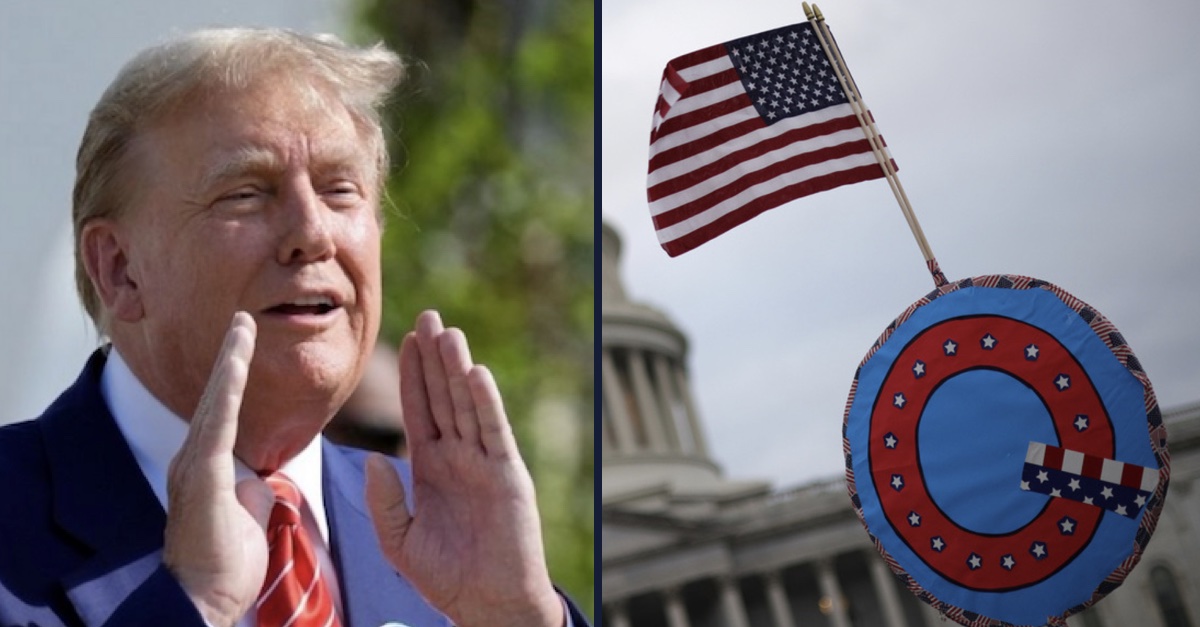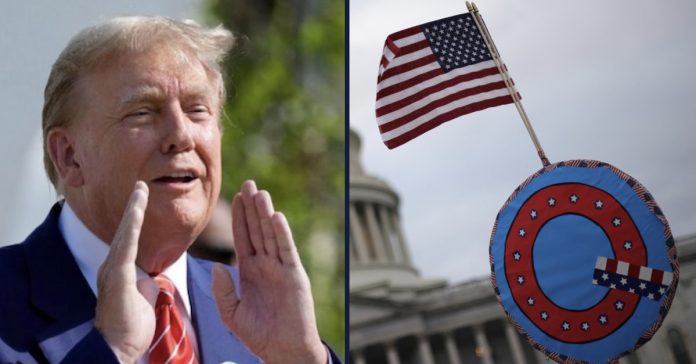
Donald Trump (pictured left) in Palm Beach, Fla., on March 19, 2024. (AP Photo/Wilfredo Lee), (right) Supporters of U.S. President Donald Trump fly a U.S. flag with a symbol from the group QAnon as they gather outside the U.S. Capitol January 06, 2021 in Washington, DC. (Win McNamee/Getty Images)
The hush-money trial judge whose recusal Donald Trump has repeatedly requested based on the political activities of the jurist’s daughter took measures to keep party affiliation from marring upcoming jury selection.
Acting New York Supreme Court Justice Juan Merchan “forewarned” on Monday that there should be no direct questioning about a prospective juror’s party affiliation, whom they voted for in the past, or whom they will vote for in the future, because the questionnaire he’s approved will provide enough clues for Manhattan District Attorney Alvin Bragg (D) and Trump’s attorneys.
“The resulting questionnaire is broad and exhaustive. It consists of 42 numbered questions, many of which contain multiple sub-questions, covering all relevant areas of inquiry. Please note, there are no questions asking prospective jurors whom they voted for or intend to vote for, or whom they have made political contributions to,” Merchan wrote. “Nor are jurors asked about their specific political party registration, though the answer to that question may easily be gleaned from the responses to the other questions. Counsel is forewarned not to seek to expand the degree of intrusion beyond what is relevant and has already been approved.”
The judge said that, despite the arguments of Trump’s lawyers, jury selection does “not” exist to “determine whether a prospective juror likes or does not like one of the parties.” This line of inquiry is “irrelevant” because it doesn’t focus on a potential juror’s “qualifications,” Merchan said.
“The ultimate issue is whether the prospective juror can assure us that they will set aside any personal feelings or biases and render a decision that is based on the evidence and the law,” he explained.
Before listing the various queries in the questionnaire ahead of the April 15 trial date, Merchan “reminded” the DA’s office and Trump’s defense attorneys of the ground rules for challenging a prospective juror’s place on the jury “for cause.” Counsel can only do so based on an individual’s apparent inability to be impartial (their “state of mind”) or if their “qualifications” fall short of what is “required by the judiciary law.”
The judge said the prosecution and defense even appeared to agree that party affiliation is not a legitimate basis to strike a juror from the case for cause.
The questions
The first seven questions focused on basic background details, such as where (generally) jurors live, what they do for a living and who employs them, their level of education, their family structure, and hobbies.
From here, the questions sought answers about whether potential jurors are members of “advocacy groups,” consumers of Fox News, CNN, Newsmax or MSNBC, readers of the New York Post, the New York Daily News, the New York Times, the Wall Street Journal or the Washington Post (among others), users of Facebook, Truth Social, TikTok, and X, and whether they are talk radio listeners or podcast viewers. For example, the questionnaire specifically asks if prospective jurors have read state witness Michael Cohen’s book “Disloyal: A Memoir” or listened to his Mea Culpa podcast.
Again, while not directly asking about party affiliation, the questionnaire asks if the potential juror if they are someone close to them has worked for Trump, worked for the Trump administration, worked for the Trump campaign, or if the juror has attended a Trump rally.
While jurors will be grilled on if they “ever worked or volunteered for an anti-Trump group or organization,” they may also be asked if they see themselves as supporters of the pro-Trump conspiracy theory known as QAnon, the Proud Boys, the Oathkeepers, Three Percenters, “Boogaloo Boys,” or Antifa.
Jurors will also be asked if they have “any feelings about how” Trump is “being treated in this case” and if “any strong opinions or firmly held beliefs” about the former president “or the fact that he is a current candidate for president” will “interfere” with their “ability to be a fair and impartial juror.”
Read the questionnaire here.
Have a tip we should know? [email protected]

